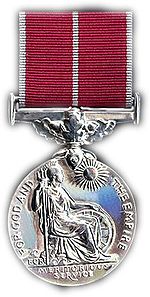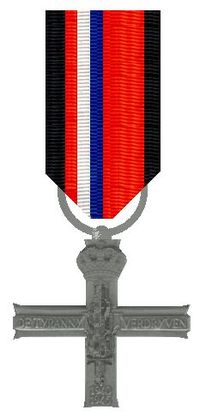Keith Banwell
Former paratroop sergeant Keith Banwell, who has died aged 81, served in half a dozen army units, made three wartime escapes, twice faced a Gestapo firing squad, survived Auschwitz and made his last parachute jump - his 1,001st - in his 78th year. Banwell bore a striking resemblance to General Sir Bernard Montgomery - but only when seated, being rather taller than the diminutive future field marshal. He served as the 8th Army commander's double in North Africa to confuse enemy intelligence. But he had moral as well as physical courage, complaining that he found sitting in staff cars boring and successfully seeking a transfer to the Parachute Regiment. At 19, he volunteered for the Coldstream Guards, but soon afterwards moved to the 1st Battalion, the Royal Hampshire Regiment, then facing widespread unrest on the North-West Frontier of India. The unit went to Palestine in 1938 and Egypt in 1939, where men from the French Foreign Legion joined it.
Always outstandingly fit, Banwell proved more than a match for them as their temporary physical training instructor. He volunteered for special service and joined 52 (Middle East) Commando; but a shortage of facilities for combined operations led him to move on to the highly adventurous Long Range Desert Group, which worked behind enemy lines alongside the SAS. He was captured during a raid on Tobruk in 1942 but stole a German truck with a friend and escaped back to British lines. He was taken prisoner again near Heraklion during a raid on German-held Crete and was guarded by Max Schmeling, the world heavyweight boxing champion of the early 1930s, who was serving in the German army. Even so, Banwell managed to escape again with friends, this time by boat. The craft ran out of fuel and drifted ashore in North Africa after nine days. Exposure and sunstroke put him in hospital for three months.
It was at this point that his likeness to Montgomery was noticed, and he was summoned to Cairo by Army Intelligence. He soon joined the 10th Battalion of the Parachute Regiment and in September 1944 took part in the debacle at Arnhem. Six of the 15 men in his Dakota were killed by anti-aircraft fire before they could jump. Once on the ground Banwell used a hunting horn to summon his men. At the end of the battle he was wounded, and captured a third time. On his way to a prison camp in Germany, he managed to leap off the train and offered his services to the Dutch Resistance as a weapons instructor under the codename "Tex", by which he liked to be known for the rest of his life. Captured yet again after a raid, Banwell was held by the Germans to have breached the Geneva Conventions by joining the Resistance and not wearing a uniform. He was court-martialled and sentenced to death. When he refused to betray his Dutch comrades to the Gestapo, he was paraded in front of a firing squad. The next day he was brought out again, only to be subjected to a barrage of blanks. Preserving both his sanity and his silence, Banwell was sent to Auschwitz. Confined in a tiny cage and starved to half his normal weight, Banwell hung on until the Red Army liberated the camp - and insisted on rejoining the 11th Battalion of the Parachute Regiment as soon as he was fit, returning to the 10th after it was reconstituted. He was then seriously injured and knocked unconscious in a training jump. Pronounced dead, he was sent to a mortuary - where an attendant noticed a flickering eyelid and saved him by artificial respiration.
After the war he remained in the Army for some years before working for the Post Office until his retirement. But he kept on parachuting, first in the Territorial Army and later as a hobby, making his 1,000th jump over Arnhem in September 1984 on the 40th anniversary of the battle; he made his 1,001st and last jump unscathed, at the same place 10 years later, for the 50th. While still in the Army Banwell took up cross-country running, helping his battalion to win the command championship six years in a row. He also excelled in road-walking, route marches and canoe races and earned high qualifications in judo, as well as marching from John o'Groat's to Land's End in full Army kit. Only one sporting ambition was left unfulfilled: he never rode in the Grand National. Banwell, who was awarded the British Empire Medal on leaving the Army as well as the Dutch Silver Cross for his Resistance work, is survived by his second wife, Anne, and by three children of his first marriage.
• Keith Demer "Tex" Banwell, soldier, born October 8, 1917; died July 25, 1999

